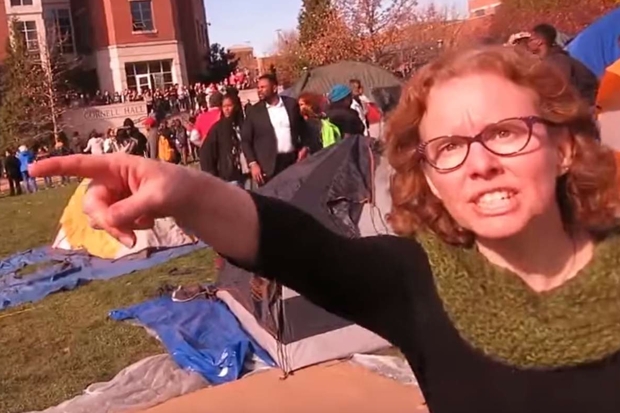I hope anyone who sees footage of the two shrieking women at Yale and Missouri will finally concede that political correctness is not ‘all about politeness’. It’s about power, and always has been.
The Yale hoo-ha started because the authorities failed to take seriously a letter from the university’s ‘Intercultural Affairs Committee’ warning about Halloween fancy dress costumes being offensive. People wonder how one of the most high-ranking universities in the world can be embarrassed by an argument over adults wearing fancy dress, but that is exactly the point; if the row was over something that mattered, there could be little kudos in winning it. This is about displaying power.
You can be very unPC and still polite and decent towards people with whom you profoundly disagree. You can also be politically correct, aggressive and intolerant. In fact, it sometimes helps. Professor Melissa Click, ‘professor of Mass Media’ at Missouri, was certainly not very polite when she appeared to threaten a student filming the protest, which was directed at the university’s handling of racial incidents. Her CV is all over the web now, as she and the Yale shrieker become victims of the same public shaming that social justice activists have so enjoyed in the past. She appears to be the very epitome of Peter Turchin’s theory of overproduction of the elites, which argues that the over-expansion of tertiary education has filled the middle ranks of society with a sense of entitlement. The shrieking Yale girl, meanwhile, despite or perhaps because of her great sense of injustice, comes from an absurdly privileged background.
The word ‘privilege’ has become engrained in the political sphere. Indeed number one on the bonkers list of demands made by the Missouri students was that the head of the university ‘acknowledge his white male privilege’. But what bigger privilege can there be in the public sphere than to have your ideas and beliefs protected and unchallenged because of your very identity?
PC is certainly not new. Students have always supported daft political ideas, largely because these ideas are seen as attractive, sexy and high-status. American students, in particular, have had a hugely intolerant streak for at least five decades, and some of the things they did in the 1970s were arguably worse than today’s escapades. E.O. Wilson, for example, ‘became a target of vilification and harassment’ (in Steven Pinker’s words) after suggesting in Sociobiology that things like altruism and violence were caused by evolution. These days, university authorities avoid dangerous themes like this, for fear that it might upset students.
Identity politics has been embedded in American (and so British) life for four decades, but it seems to be getting worse. Perhaps this is just the manifestation of the ugly stage of revolution, when revolutionaries must turn on each other; it may also be that, as universities have become less white and male, the number of people incentivised to feel grievances has grown.
Incentives certainly play a big part; if students, and people in wider society, are rewarded for seeing injustice and slights everywhere, then they will see them everywhere. If people who cause disturbances in institutions over trivial or contrived reasons are rewarded – with the resignation of a senior staff member, for instance – rather than discouraged, then more people will do it.
Part of the problem with the American – and British – left is that the previous generation has built a system of grievance-based politics which strongly incentivises younger members to try to outflank them with ever more extreme demands. Therefore the revolution must consume its children in order to progress, until eventually social justice politics reaches its singularity. Or reaction sets in.







Comments